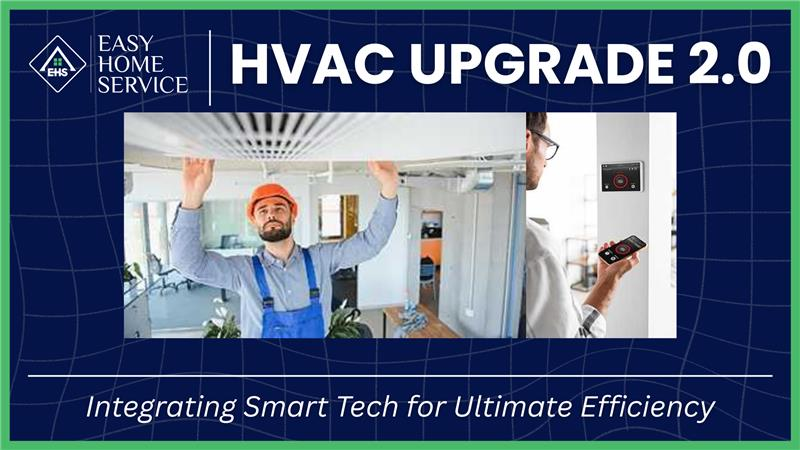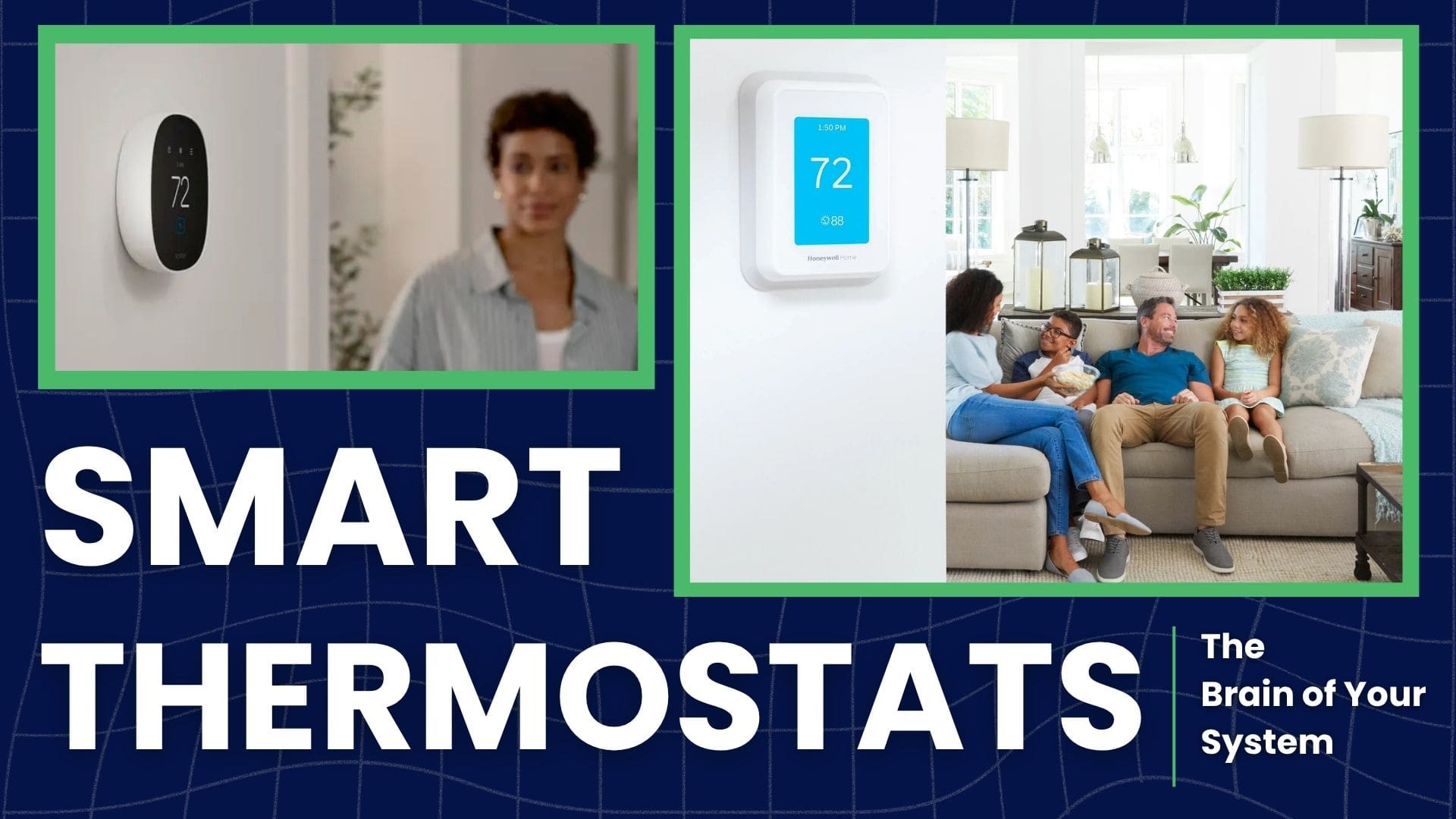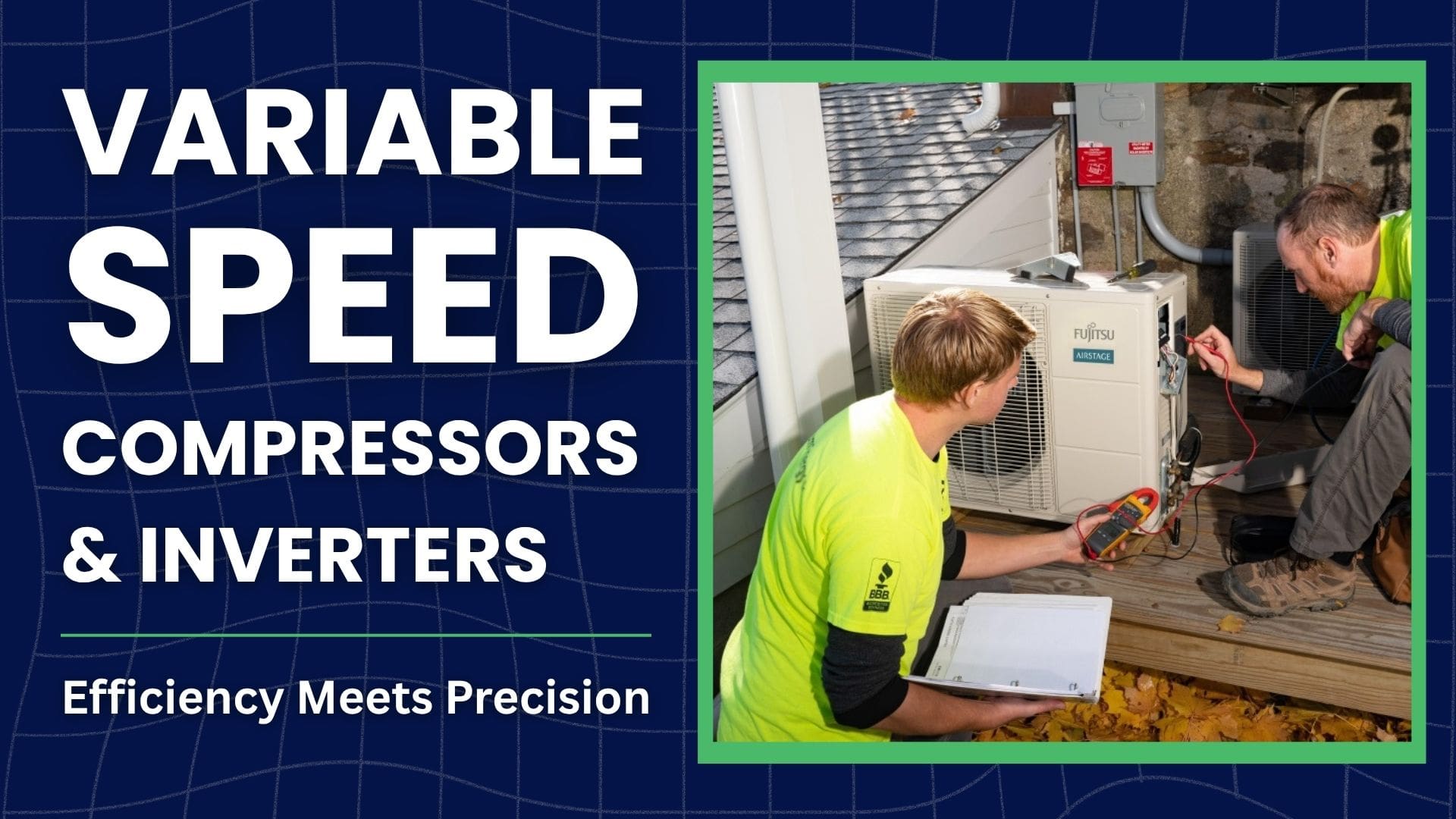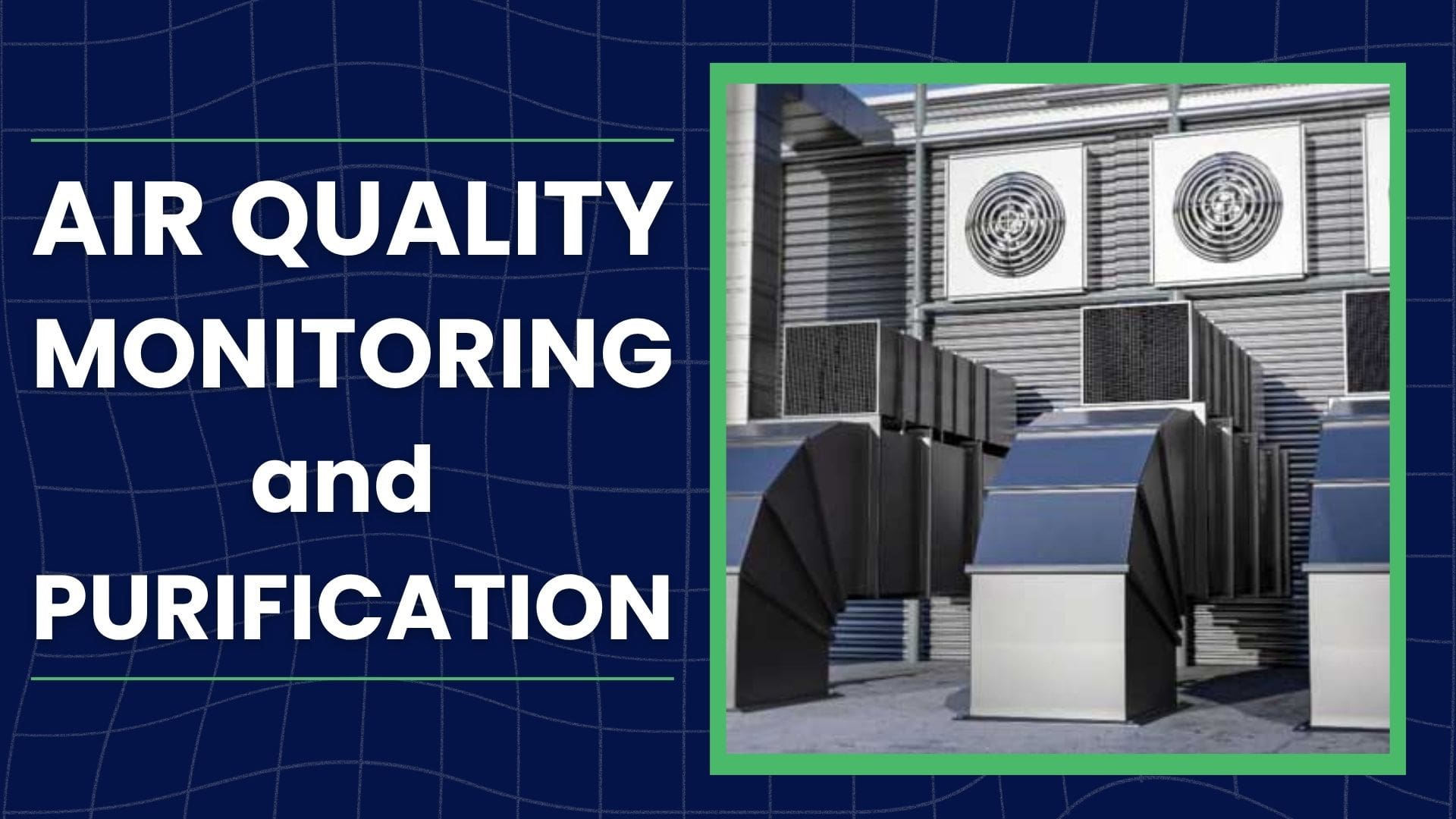Your Go-To for Complete Home Solutions and Trusted Excellence
Your Go-To for Complete Home Solutions and Trusted Excellence

Imagine returning home after a stressful day to a perfect temperature waiting for you cool in the summer, cozy in the winter without lifting a finger, Say Goodbye to fiddling with clunky thermostats or battling room temperature hotspots. Hello, Age of HVAC Upgrade 2.0, where intelligent smart technology transforms your air-conditioning and heating system into a smart, energy-saving giant.
This is not comfort it’s about rethinking the way your home breathes, works, and saves you money. With thermostats that learn through AI to compressors that whisper silently at variable speeds, the future of HVAC is here, and it’s a whole lot smarter. Upgrade your system and step into a world of ultimate efficiency and convenience. Let’s discuss how smart technology is changing everything you ever thought you were about home climate control.
Old Upgrading HVAC systems typically lack efficiency, outdated controls, and energy waste. In the US alone, cooling and heating contribute to almost 48% of home energy usage a mind-boggling number. Smart HVAC upgrades look to alter everything with the aim of maximizing each and every watt consumed.
Smarter HVAC systems use data, sensors, and connectivity to adapt to your lifestyle, outdoor climate, and home occupants. The reward? Precise temperature control, less energy expenses, and higher air quality without the headache.
What makes a smart HVAC upgrade truly "smart"? Technology. New systems utilize smart devices including smart thermostats, zoning, and real-time sensing to improve comfort, save energy, and adapt to your lifestyle. These technologies are driving HVAC Upgrade 2.0, elevating the time-honored climate control experience to a personalized, optimized experience.
Let us examine more deeply the most significant technologies that underpin everything.

Smarter thermostats like Google Nest, Ecobee, and Honeywell Home have revolutionized temperature control. They learn your schedule and your routines and adjust automatically to avoid energy wastage. They also have the additional features:
✔Remote control via smartphone apps
✔Geofencing to modify settings on exiting or entering
✔Energy consumption reports to help you optimize usage
✔Integration of smart home ecosystem (Alexa, Google Assistant, Apple HomeKit)
Research indicates intelligent thermostats can cut HVAC usage by 10-15%, which translates to handsome savings on a yearly basis.

Latest HVAC upgrades can be outfitted with zoning systems that employ several thermostats and dampers to manage temperature room by room. This lets you cool or heat only those areas used by people, improving comfort and trimming energy bills.
Zoning technology is especially helpful in multi-level houses or large houses, which prevents the all-too-common hot and cold spot situation.
3. Variable Speed Compressors & Inverters: Efficiency Meets Precision

The most recent HVAC systems employ variable speed compressors and inverter technologies to change power output dynamically. Instead of turning on/off sharply, the system runs at a spectrum of speeds to meet exact cooling or heating demands.
Benefits are:
✔Lower energy consumption
✔Reduced wear and tear on equipment
✔Reduced operating noise
✔More stable indoor temperatures

Smarter HVAC upgrades are now commonly featuring indoor air quality (IAQ) sensors that sense humidity, CO2, dust, and VOCs (volatile organic compounds). Integrated purification systems can automatically turn on to clean and filter the air, protecting your family’s health.
Your HVAC system just heats and cools, doesn't it? Think again. Smart technology is involved, and you get a full-service comfort manager who learns your routines, saves energy squandering, and even lets you know before something goes wrong. A technologically sophisticated HVAC upgrade is more than a system upgrade it’s smartening your whole home – health-wise, cost-wise.
Let's discuss the real world usage of combining smart technology with your HVAC system upgrades.
Next-generation HVAC technology tunes your system for its highest performance by reducing unnecessary cooling and heating through real-time responses to conditions like occupancy, time of day, and weather. Smart operation can reduce your energy consumption by 20–30%, which means substantial savings on typical utility bills. And through rebate programs and energy credits that are typical in most locations, those savings could start on day one.
Your HVAC system needs to work for you not the other way around. With the features of adaptive learning, geofencing, and automated scheduling, smart systems get the indoor climate just right without repeated adjustments.
No more awakening to a cold room or stepping into a hothouse only seamless, on-demand comfort to match your way of life.
Energy-efficient HVAC systems save you money they use less energy, which means less environmental impact. By being more efficient and having more intelligent controls, these systems reduce a home’s carbon footprint.
If you're interested in sustainability, a technologically driven HVAC upgrade is a stride towards more responsible and environmentally friendly living.
Why let your HVAC system malfunction? Smart systems contain advanced sensors and built-in self-diagnostics that keep an eye on system health in real time. You’ll get alerts for issues such as dirty air filters, irregular energy usage, or component failures before they develop into large problems.
This predictive maintenance not only saves you from expensive emergency repairs, but it also extends the life of your system saving you money and worries down the road.
From Outdated to Automated: Charting Your HVAC 2.0 Experience
Upgrading HVAC system to boost comfort, energy efficiency, and future-proof your home but planning appropriately is essential. Here’s a step-by-step guide on how to achieve the most from your HVAC Upgrade 2.0:
Before you begin examining upgrades, get to know your existing system inside and out. How old is your system? Is it struggling to heat and cool your home? Older units 10-15 years or more aren't very energy efficient and are probably costing you more on your utility bill than necessary. A changeout of a system with a smart energy-efficient system can be a big payoff in these types of situations. On already fairly modern systems operating satisfactorily, adding smart controls like thermostats and sensors can bring your system up to the modern age without change. Knowing the condition and efficiency of your existing system is the beginning of a smart upgrade plan.
Not all of the smart HVAC solutions are equal. Start with the basics a smart thermostat is a good place to begin, with remote control of temperature, adaptive schedule, and energy usage tracking. If you have multiple zones or distinct heating/cooling requirements (such as upstairs bedrooms vs. downstairs living areas), it’s worth shelling out for zoning systems or smart vents to manage the climate by room, boosting comfort and minimizing waste. Don’t forget to incorporate air quality sensors and humidity sensors for healthier indoor environments. Match the technology to your lifestyle and home size for the greatest return on investment.
Smart HVAC upgrades often require specialized expertise from smart thermostats installation to zone control installation and sensor interfacing. Avoid costly pitfalls and achieve system full potential by hiring qualified HVAC technicians experienced in smart installation. These professionals can properly calculate load, size equipment correctly, and anticipate prospective issues. They can also walk you through rebates, warranties, and installation for seamless operation.
If you already live in a smart home with voice assistants like Alexa, Google Assistant, or Apple’s HomeKit, don’t miss the chance to integrate your HVAC system with your existing ecosystem. Voice control like “Set the living room to 72 degrees” or automated routines that adjust temperature based on your schedule provide convenience and control. And by linking your HVAC to smart lights, security, or occupancy sensors, you can achieve a very interconnected, energy-saving home that responds to your lifestyle automatically.
Check out our expert-approved options and get customized advice to pick the most efficient system.
HVAC technology is evolving rapidly due to rising demands for comfort, efficiency, and environmental responsibility. Smart control technologies, green-friendly materials, and alternative energy sources are transforming the manner in which we cool, heat, and ventilate. Staying current on these future trends can give you a competitive edge in a world committed to sustainability and smart living.
✔ AI & Smart Controls: Systems that learn occupants' habits and automatically adjust the temperature for ultimate comfort and energy efficiency.
✔ Energy Efficiency: Newer compressors, variable-speed drives, and better insulations reduce power consumption.
✔ Eco-Friendly Refrigerants: New low-global-warming-potential (GWP) refrigerants replace harmful chemicals.
✔ Integration of Renewable Energy: HVAC systems powered by solar energy and clean energy.
✔ IoT Connectivity: Remote control and live monitoring through smart home networks and mobile phones.
✔Improved Indoor Air Quality: Enhanced air ventilation and filtration to reduce pollutants and allergens.
✔ Predictive Maintenance: Sensors detect issues in advance to prevent failures and prolong the life of equipment.
Conclusion
HVAC Upgrade 2.0 represents a major leap forwardcombining smart technology, energy efficiency, and eco-friendly solutions to deliver superior comfort while reducing environmental impact. By embracing these advanced systems, homeowners and businesses can enjoy better air quality, lower costs, and a more sustainable future. The time to invest in next-generation HVAC is now, unlocking a new era of intelligent climate control.
FAQ (Frequently Asked Questions)
1. What is HVAC Upgrade 2.0 and how is it different from traditional systems?
HVAC Upgrade 2.0 bundles modern smart tech- think AI thermostats, room-by-room zoning, and live sensors- into your heating and cooling plan. While old systems follow a set clock, these new setups watch your schedule, feel outside changes, and fine-tune comfort on the fly, often wasting much less energy.
2. Will a smart HVAC system really help reduce my energy bills?
Absolutely, and often by a lot. Because the system adjusts in real time to your habits, the weather, and which rooms need air, it can slash energy use by 20 to 30 percent, meaning you see smaller bills month after month.
3. What smart features should I look for in an upgraded HVAC system?
Look for these must-have smart options:
4. Is it possible to upgrade my existing HVAC system with smart technology, or do I need a complete replacement?
Yes, you can add smart gadgets to a young, working furnace or A-C-R-style, th-smart thermostat, air-quality alert, and duct sensor. Older gear, though-roughly 10 to 15 years or older-may need, though, a whole-new system line inverter equipment-to fully tap energy gains and server-grade features.
5. Do I need a specialist to install a smart HVAC system?
Definitely. Qualified pros protect reliable wiring, test sensors accuracy, match units to your Wi-Fi, and fine-tune settings. Hire certified, smart-savvy techs so the system runs safely, quietly, and you stay eligible for rebates, warranties, and peace of mind.
6. In which areas do you provide HVAC repair and replacement services?
We proudly offer HVAC repair and replacement solutions across Arizona, California, Florida, Maryland, Illinois, Ohio, North Carolina, Texas, and New York. Our network of skilled professionals provides complete HVAC services, including HVAC repair, installation, and replacement.
7. What types of home services do you offer?
We connect homeowners with trusted professionals for a wide range of home services, including:
✔ Storm Proof Your Home: Why Storm Windows Maryland Are a Game Changer
✔ Historical Windows - A Look at Architectural Styles Across America
Find Top Rated Service Providers
We help you find top service providers and compare quotes.
Leave a Comment: